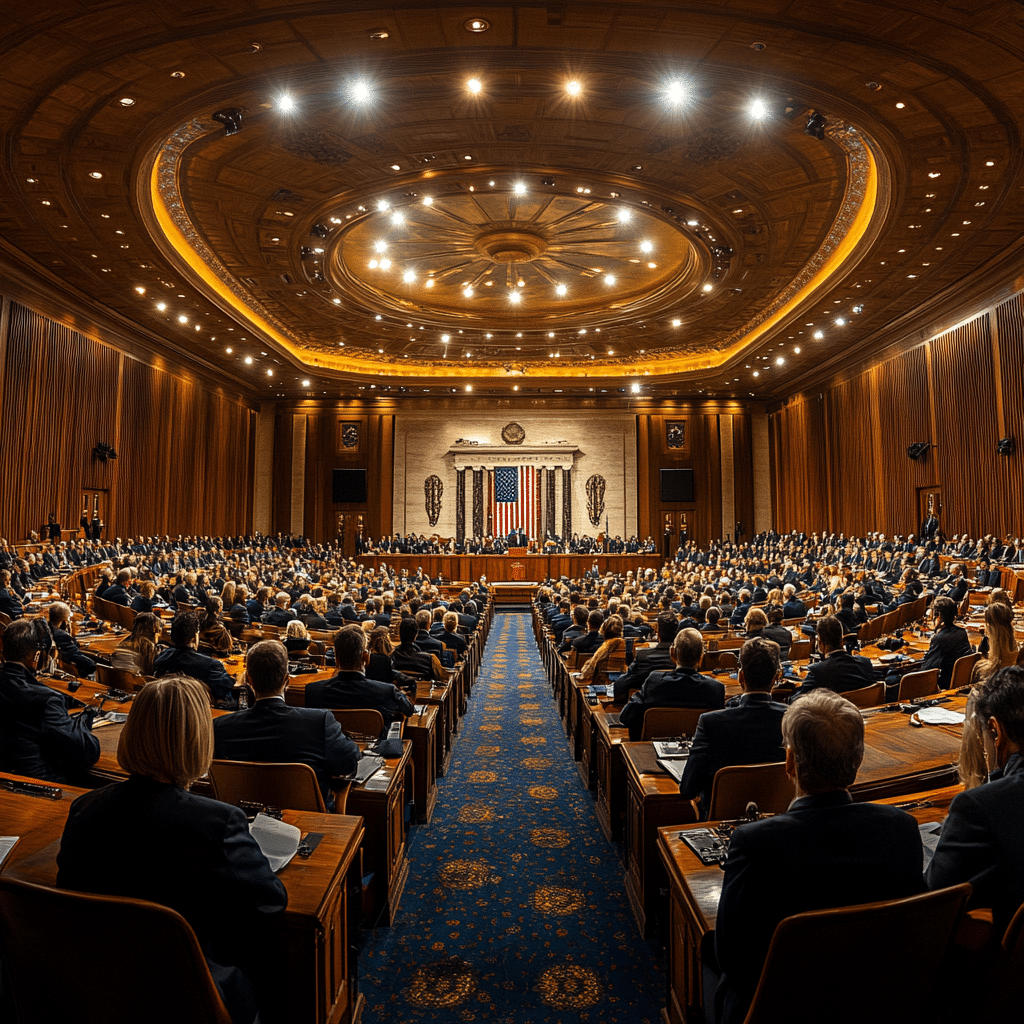The House Permanent Select Committee on Intelligence (HPSCI) plays a pivotal role in overseeing U.S. intelligence activities. As we move through 2024, understanding the responsibilities and initiatives led by the HPSCI is more important than ever. With national security matters becoming increasingly intricate, examining the committee’s current projects, challenges, and future directions sheds light on how it aims to safeguard American interests.
Top 5 Current Initiatives by the House Permanent Select Committee on Intelligence

1. Strengthening Cybersecurity Protocols
Cybersecurity has risen to the forefront of national security concerns, particularly with growing incidents of data breaches. The House Permanent Select Committee on Intelligence is prioritizing the enhancement of cybersecurity measures across federal agencies. This initiative has seen collaboration with technological giants like Microsoft and CrowdStrike, aiming to develop stronger defenses and protect sensitive national security information. An engaging approach is incorporating tools that can detect suspicious activities in real-time, which is crucial in safeguarding intelligence data.
2. Addressing Foreign Influence Operations
The HPSCI is responding to the alarming influx of foreign influence operations, especially in U.S. electoral processes. Thanks to the lessons learned from past election interferences—most notably the controversies surrounding the 2016 presidential election—the committee is advocating for stricter regulations on social media platforms such as Facebook and Twitter. These recommendations target misinformation campaigns, aiming to foster transparency and safeguard the democratic process from foreign meddling.
3. Enhancing Oversight of Intelligence Agencies
Accountability is a cornerstone of effective governance, and the HPSCI is committed to bolstering oversight of intelligence agencies. Recent initiatives include implementing new protocols that require regular transparency reports from agencies like the CIA and NSA. Such oversight helps ensure that national security measures are balanced with civil liberties, which is essential in maintaining the public’s trust.
4. Realigning Resources for Emerging Technologies
With artificial intelligence (AI) and machine learning reshaping numerous sectors, the House Permanent Select Committee on Intelligence is adapting accordingly. The committee is reallocating resources toward R&D in these cutting-edge technologies, collaborating with leaders in the tech space—such as IBM and Google. The goal is to cultivate innovations that enhance national security efforts while keeping pace with technological advancements.
5. Promoting Global Intelligence Sharing
In an era where threats are increasingly transnational, the HPSCI acknowledges the necessity for cooperative intelligence sharing with allies. Strengthening partnerships with entities like NATO and the Five Eyes alliance reflects this commitment. The committee is pushing for streamlined sharing protocols that protect sensitive information while facilitating intelligence exchange among allies, boosting collective security measures.
Challenges Facing the House Permanent Select Committee on Intelligence
1. Political Polarization
Operating within a highly polarized political environment presents significant hurdles for the House Permanent Select Committee on Intelligence. Issues like surveillance legislation often get caught up in partisan disagreement, stalling progress on critical reforms. Consequently, the committee struggles to find common ground on vital security strategies amidst ongoing political squabbles.
2. Technology’s Rapid Advancement
The rapid pace of technological innovation poses a considerable challenge for the HPSCI. As intelligence practices strive to keep up, the committee must navigate the fine line between enhancing capabilities and protecting citizens’ rights. Ensuring that evolving technology complements rather than infringes on civil liberties remains a daunting task for the committee members.
3. Budget Constraints
Limited federal funding poses challenges for many initiatives under the House Permanent Select Committee on Intelligence. The need to balance budgetary restrictions with national security priorities often leads to tense discussions about resource allocation. Consequently, intelligence agencies may feel the strain of inadequate funding, hindering their ability to implement crucial programs.
4. Maintaining Public Trust
Public skepticism towards government oversight has heightened the need for effective communication from the HPSCI. High-profile controversies, like ongoing surveillance programs, have raised concerns about transparency. In response, the committee focuses on reassuring citizens about their privacy rights and the necessity of intelligence operations for safety.
5. Adapting to New Global Threats
Global threats continue to evolve, posing challenges for the HPSCI. From non-state actors to cybercriminals, intelligence operations must be agile and responsive. The committee actively assesses these dynamic security challenges to formulate proactive measures that can effectively counter emerging threats, ensuring that the U.S. remains prepared.

Future Directions for the House Permanent Select Committee on Intelligence
As national security matters develop, the House Permanent Select Committee on Intelligence is gearing up to address critical areas to maintain security.
Prioritizing Human Intelligence
While technological advancements are impressive, human intelligence (HUMINT) remains crucial. The committee emphasizes the significance of gathering actionable insights from human sources, especially in conflict-torn regions. By investing in HUMINT, the HPSCI aims to complement surveillance capabilities effectively.
Policy Formulation for Artificial Intelligence
Given the instrumental role AI technologies play in intelligence operations, the HPSCI is expected to create guiding policies. These policies will frame ethical considerations and accountability for AI applications, ensuring responsible use in intelligence gathering. Establishing these guidelines will be crucial in navigating the complex landscape technology creates.
Strengthening Counterintelligence Operations
Espionage threats continue to loom large. To counter these, the HPSCI is dedicated to enhancing counterintelligence efforts. This includes improved training for operatives, ensuring they are equipped with the skills necessary to detect and thwart foreign intelligence activities effectively.
Establishing Civil Oversight Mechanisms
The HPSCI recognizes the importance of balancing national security interests with the protection of civil liberties. To bolster public confidence, the committee intends to advocate for external oversight bodies. These mechanisms will hold intelligence operations accountable, helping to foster transparency and trust with the American people.
The House Permanent Select Committee on Intelligence stands as a cornerstone of U.S. national security operations. Its current initiatives, ongoing challenges, and strategic future directions highlight the committee’s essential role in addressing pressing security concerns. As America navigates through 2024, the significance of HPSCI in shaping a secure and resilient national framework becomes increasingly vital. With a commitment to innovation, oversight, and responsibility, the committee continues to step up to the plate in an ever-complex global arena.
House Permanent Select Committee on Intelligence: Engaging Trivia and Insights
A Deep Dive into Oversight and Fun Facts
The House Permanent Select Committee on Intelligence holds a crucial position in overseeing national security matters, providing insight into significant decisions impacting global safety. Established in 1977, this committee is not just about scrutinizing agencies but also about ensuring that the American people are protected. Fun fact: just as various public figures analyze the impact of policies, you can optimize your game strategy using an Nba Optimizer for your fantasy leagues! Both activities require keen analytical skills—but one enjoys a leisurely Sunday, while the other determines national security.
Moreover, did you know that the committee’s work inspires debates that can echo through popular culture? For instance, the tension seen in series like “Vice Principals,” starring a unique cast, mirrors the high-stakes situations tackled by the committee. Just like in “Vice Principals,” where relationships are multifaceted, the House Permanent Select Committee on Intelligence works through layers of complexity within intelligence matters. With its unique mandate, members often rely on diverse backgrounds, enhancing their competency in tackling various security challenges.
Beyond the Committee: Interesting Connections
Also interesting is how the everyday world intersects with topics like those the House Permanent Select Committee on Intelligence addresses. For example, consider how important communication is for the committee’s effectiveness, akin to what you might catch on a local radio show—just like Jim Scott’s engaging segments on Cincinnati Radio. An informed public yields a healthy democracy, just as catchy funny Usernames can bring a smile, reminding us that connections matter in any discourse.
And finally, history shows us that even strange stories can draw parallels with intelligence work, like the tale of Skylar Deleon, which highlights how deception can play a role in security. Alongside, there’s always something happening in tech and pop culture, like the impact of the popular internet trend Skibidi Rizz capturing the youth’s attention, transforming social conversations just as national security evolves alongside modern tactics. The governance of national security and intelligence is an intricate puzzle, with connections that may surprise you!




